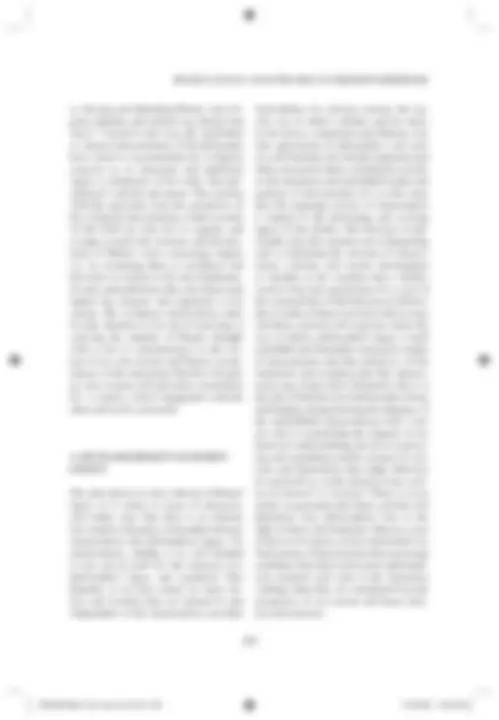













Study with the several resources on Docsity

Earn points by helping other students or get them with a premium plan


Prepare for your exams
Study with the several resources on Docsity

Earn points to download
Earn points by helping other students or get them with a premium plan
Community
Ask the community for help and clear up your study doubts
Discover the best universities in your country according to Docsity users
Free resources
Download our free guides on studying techniques, anxiety management strategies, and thesis advice from Docsity tutors
The significance of Hume's place in the history of British Empiricism and the impact of different interpretations on our understanding of his philosophical legacy. the classical sceptical interpretation, the 'Reid-Beattie' account, and the irreligious interpretation, highlighting their influence on subsequent generations of philosophers.
Typology: Summaries
1 / 19

This page cannot be seen from the preview
Don't miss anything!












David Hume (1711–76) is one of the most important among philosophers because he developed to its logical conclusion the empirical philosophy of Locke and Berkeley, and by making it self-consist- ent made it incredible. (Bertrand Russell, A History of Western Philosophy )^1
It is a familiar feature of historical studies of various kinds that an understanding of a given activity or event requires that it be placed in some wider scheme or framework that will enable us to say something intelligible about its nature and significance. Generally speak- ing, this requires us to look beyond the inten- tions and thoughts of the agents involved, so that we can appreciate and recognize their acts and activities in relation to both what went before and what came after. It is a legiti- mate and indeed crucial responsibility of the historian to be able to identify and describe the larger movements, processes and develop- ments that hold agents and events together and represent and relate them in some coher- ent fashion. W.H. Walsh has coined the term
‘colligation’ to cover the activity by which historians arrange and gather different events together ‘under appropriate conceptions’.^2 The activity of colligation is also plainly essential to the history of philosophy and it presents us with some similar challenges and difficulties arising from our efforts to make sense of the larger sweep and developments that shape the course of the history of phi- losophy. In this chapter I am concerned with these issues as they relate, more specifically, to describing and evaluating the philosophi- cal legacy of David Hume.^3 The general notion of a philosopher’s leg- acy is, of course, intimately bound-up with the way in which the writings and contribu- tions of that philosopher have been read and interpreted – both by his own contemporar- ies and by those who have followed. Clearly, however, interpretation and legacy are not the same thing. A philosopher’s legacy reaches well into the future and is inevitably shaped, not only by various factors and features that the author has no control or influence over, but also by critical responses and creative contributions of others which could not be anticipated and which may not even be intel- ligible or meaningful to the author or thinker concerned. Philosophers, like other historical
agents, may have their own aims and ambi- tions about how their work is received and what impact it may have. Nevertheless, every thinker who is party to the on-going debate is aware that his or her ideas and arguments will be considered and assessed, not just with a view to what has happened prior to presen- tation, but also with a view to what will hap- pen long after he or she is no longer around to answer for those ideas and arguments. Their contributions are, in this sense, open- ended and will inevitably be transformed and amended in the subsequent flow of philo- sophical discussion and debate. In the light of these considerations, the historian of phi- losophy must always allow for the possibility that a ‘gap’ may open up between the philos- opher’s original intentions and objectives and that philosopher’s actual legacy, understood in terms of the impact and reception of his ideas over time. Related to this point, there is no guarantee that an accurate or full interpre- tation of the author’s original intent will prop- erly or adequately explain the overall impact of his or her contribution on the subsequent unfolding of the philosophical conversation. The potential of this gap is, indeed, crucial if philosophical ideas are to prove fertile and creative for later generations of thinkers. While an important and crucial gap between interpretation and legacy must be recognized and accepted as a given of the his- tory of philosophy, there remains an intimate and complex relation between them. In the first place, the actual influence and impact that a philosophical thinker and his ideas will have – understood in terms of the kind of critical reception and creative development that they are subject to and receive – is itself, as we have noted, conditioned by how his contemporaries and those who follow inter- pret the arguments and works in question. The interests, prejudices and perspectives of
this audience will, naturally, affect the man- ner of the interpretation provided – what is emphasized, what is found significant and worthwhile, and so on – and this will shape the trajectory and impact of the philosophical contributions under consideration. However much a philosopher’s legacy takes on a life of its own, after publication, interpretation continues fundamentally to constrain and direct the perceived worth and value of his work – either for better or for worse. To this extent, the ongoing debates concerning inter- pretation themselves become an integral com- ponent of a philosopher’s legacy. There are, plainly, issues and concerns to be noted in this regard. For example, a good, accurate inter- pretation may prove to be a philosophical dead-end or limited in its future creative pos- sibilities. Similarly, an incomplete and inad- equate interpretation, one that we may judge partial and piece-meal, may nevertheless turn out to be highly fruitful, even though it may plainly distort or misrepresent the original intentions of the thinker who is the source of these (later) developments. It cannot be said, therefore, that there is any simple or neat cor- respondence between accurate and reliable interpretation and productive and fruitful critical philosophy following in its wake. Part of the task of the historian of philosophy is to keep a keen eye open for these points of diver- gence between interpretation and legacy. A further important complication to be noted concerning the interpretation/legacy relationship is that they have a dynamic and reciprocal relationship. That is to say, it is a mistake to treat interpretation as essentially a static condition of the subject matter (e.g. a fixed text with an established, rigid meaning) and the legacy or critical value of the work as involving a process of building upon this in a manner that prevents or precludes chal- lenging or questioning the (established or
free will, etc.) lack any foundation in reason. Interpreted in this way, Hume’s project is read as serving to show that when the theory of ideas is embraced as the starting point of our philosophical investigations, as suggested by his empiricist predecessors (i.e. Locke and Berkeley), then radical and extreme sceptical consequences will directly follow. This view of Hume’s philosophy is suc- cinctly summed up by James Seth in his his- tory of English Philosophers and Schools of Philosophy (first published in 1912).^6 Seth suggests that it was Hume’s achievement to follow relentlessly ‘the logical consequences of the empirical point of view’ to their inevi- table sceptical conclusion.^7 According to Seth, Hume’s relationship with Locke and Berkeley can be explained in these terms:
It would be unjust to both Locke and Berkeley to say that they stopped short of these [sceptical] conclusions from theological or other prejudices. The truth is that empiricism was only a part of their philosophy, the other part being
... of a rationalistic type; so that we can- not describe the sceptical philosophy of Hume as the complete logical develop- ment of the Lockean and Berkeleyean philosophy, but only as the logical com- pletion of the empirical element in the philosophy of his predecessors. That which had for them been a part becomes for Hume the whole: he is an empiricist pure and simple, and he shows us with singular insight the ultimate meaning and consequences of pure empiricism.^8
Hume was, Seth claims, ‘fully conscious of the novel and revolutionary character of his views, as substituting scepticism, the result of a thorough-going empiricism, for the mix- ture of empiricism and rationalism which he found in Locke and Berkeley.. .’.^9 Seth’s
sceptical reading of Hume’s empiricist princi- ples more or less codifies what was, until well into the twentieth century, the orthodox view of Hume’s basic intentions and ambitions.^10 The classical empiricist-sceptical interpre- tation has certain prominent features which have shaped the reception of Hume’s philos- ophy up until the present time. Hume’s major text, on this view, is his first and most sub- stantial work, his Treatise of Human Nature (1739–40). While his Enquiries and later writings on religion (e.g. his posthumously published Dialogues concerning Natural Religion ) are essential for an understanding of his complete philosophy, and its modifi- cations and development over time, the real core of Hume’s philosophical achievement and insight is still taken to reside with the central arguments and aims of the Treatise. From this general perspective, the primary interest of the Treatise rests with the episte- mological and metaphysical topics raised in Book One, ‘Of the Understanding’. Although Hume’s arguments on these topics were further refined and modified in the first Enquiry , his most powerful and original con- tributions, containing his ambitious sceptical assault on the foundations of human under- standing, are presented in their most potent form in the Treatise. While he, no doubt, had interesting and worthwhile things to say on other matters relating to morals, politics and religion, the sceptical reading gives pride of place to the question of the scope and limits of human understanding. 11 According to this general account, Hume’s philosophical significance in the history of philosophy rests squarely with the funda- mental sceptical challenge that he has posed and that all subsequent generations of phi- losophers must address and respond to. This challenge takes the form of asking to what extent human understanding and human
knowledge can be vindicated against the (extreme sceptical) conclusions that Hume has advanced on the basis of his empiri- cist principles. One line of reply has been to repudiate and reject Hume’s empiricist assumptions, as we find in the philosophical views of Reid and, above all, Kant. Another alternative is to accept and embrace his empiricist commitments and to reconstruct the whole edifice of human knowledge in the light of Hume’s sceptical constraints and the limits they impose on our metaphysi- cal investigations and ambitions. This is the route that was taken, in various forms, by later generations of ‘British empiricists’, such as John Stuart Mill, Bertrand Russell and A.J. Ayer.^12 The primary lesson to be learned from Hume’s philosophy, from the perspective of his empiricist followers in this tradition, is that all a priori metaphysical system-building and speculations are worthless. All genuine knowledge, as it concerns our understanding of the nature of reality, must take the form of either empirical science or mathematical and logical investigations. Hume’s significance, so interpreted, is that he reorients philoso- phy to play the only role it is truly capable of, which is to provide a clear logical and psychological framework and foundation for the empirical study of nature by means of the natural sciences. When philosophy attempts to step outside these boundaries the inevi- table result is ‘sophistry and illusion’ (EHU, 12.34 / 165). 13 Interpreted in terms of his empiricist- sceptical programme, Hume’s legacy has been to direct the philosophical energies of the British tradition (along with its American and continental adherents) in the direction of an empiricist understanding of our scien- tific practices and procedures. The central problems of philosophy, so understood, are constituted by the relevant set of problems
generated by this core programme: induction and causation, knowledge and belief, per- ception and the external world, the nature of mind and self, and questions of meaning and language. 14 Understood in these terms, the task of empiricist philosophy is to iden- tify and describe the basic building blocks of human knowledge and explain them in a manner that is consistent with the empiricist commitments. The basic elements for this project are provided by Hume’s philosophy, beginning with his account of impressions and ideas (or ‘sense data’ in the idiom of a later generation of empiricist thinkers). One way in which later generations of empiri- cist thinkers – particularly in the twentieth century – amended and altered the focus of Hume’s empiricist programme, was in the emphasis they gave to problems of language and logic. (This trend is especially apparent in the work of Russell and Ayer.) Hume’s philosophy, in contrast with earlier think- ers in the empiricist tradition (i.e. Locke and Berkeley, but most notably Hobbes), pays rather scant attention to problems of language and meaning and manifests a stronger interest in the psychological proc- esses of human understanding than in the logical analysis of its forms and structure.^15 However, although this is a clear point of contrast between Hume and the major repre- sentatives of twentieth-century British empir- icism, Hume’s contributions continued to play a crucial role as a source of many of the key components and distinguishing features of their systems. Perhaps the most striking example of this is the way in which ‘Hume’s fork’ – his distinction between ‘relations of ideas’ and ‘matters of fact’ (EHU 4.1 / 25; cf. THN 3.1.1.9 / 458) – serves as the basis of the verification principle of logical positiv- ism. According to the logical positivists, the meaning (or significance) of any statement
difficulty presented by any account that aims to accommodate Hume’s (putative) ambi- tion to become ‘the Newton of the moral sci- ences’. How can this ambition be reconciled, not only with his (strong) sceptical principles, but with a form of ‘naturalism’ that maintains ‘that reason, as traditionally understood, has no role in human life’? 28 Claims of this kind are difficult to square with an understanding of Hume’s philosophy as a contribution to the ‘science of man’. The basic concern here is not simply that Hume’s aims and objectives are plural, com- plex and multi-faceted. The real concern is that his most basic commitments – his sceptical principles and his scientific ambi- tions – are in direct conflict with each other, rendering his entire philosophical system broken-backed. This was an issue that was clearly understood by Thomas Reid, who is generally recognized as the most percep- tive and penetrating of Hume’s early critics. Speaking of Hume’s Treatise Reid says:
It seems to be a peculiar strain of humour in this author, to set out in his introduc- tion by promising, with a grave face, no less than a complete system of the sci- ences, upon a foundation entirely new – to wit, that of human nature – when the intention of the whole work is to show, that there is neither human nature nor science in the world.^29
These observations concerning the appar- ently fractured and conflicting nature of Hume’s basic intentions in his major philo- sophical writings are indicative of the general problematic that has occupied Hume schol- ars for more than a century. The difficulty has been to provide a coherent, consistent account of Hume’s philosophy in a manner that fully acknowledges the existence of both
his sceptical and naturalistic commitments. While it is tempting to emphasize one side or the other of this divide, or simply to set aside or overlook their opposition, a more satisfy- ing approach must tackle this difficulty more directly. These (ongoing) fundamental problems of interpretation are not without relevance for our understanding of Hume’s legacy. In par- ticular, the problem we are presented with is that these difficulties of interpretation, and the lack of consensus and agreement concerning the character of his philosophical aims and achievements, encourage the thought that his philosophical legacy, erected as it is on the foundation of the (problematic) scepticism/ naturalism dichotomy, may itself rely upon a faulty or incomplete understanding of his philosophy. That is to say, while there can be no doubt that his philosophy has established itself as a main pillar in the larger edifice of ‘British empiricism’, the difficulties and doubts of interpretation that we continue to encounter suggest that this entire edifice, in so far as it is supposed to help us understand Hume’s own philosophical contribution, is itself unstable and liable to collapse under critical scrutiny. Another way of putting this general point is to say that the dominant col- ligatory concept in terms of which Hume’s legacy has reached us (i.e. in the early twen- ty-first century) is that of the idea of ‘British empiricism’. It is under this general rubric that Hume is portrayed as having played the pivotal role of developing the arguments and ideas of his great predecessors (Locke and Berkeley) and laying the foundations for subsequent developments in the same tradi- tion, by thinkers who were operating with the same basic set of empiricist commitments and constraints found in Hume’s system (i.e. Mill, Russell, Ayer, et al.). The fact that inter- pretations of Hume’s philosophy constructed
around this core colligatory concept render Hume’s philosophy hopelessly fractured and incoherent suggests that this concept and the interpretation(s) associated with it need to be radically revised, if not abandoned altogether.
Before we consider what alternative inter- pretations may be made available to us, were we to abandon the colligatory framework of ‘British empiricism’ and the scepticism/ naturalism dichotomy associated with it, we should first consider our methodological situation. There is no ‘going back’ on Hume’s established legacy or impact as understood over the previous century or more, consid- ered as a pivotal figure in the British empiri- cist tradition. It is a (historical) given that this has indeed been the dominant perspective in which his philosophy has acquired influence and secured a prominent place in the history of philosophy. Nevertheless, as we noted, these facts relating to Hume’s established and existing legacy do not themselves serve to guarantee the adequacy or reliability of the interpretations on which this legacy has been built. The internal, persisting problems of interpretation force us to reconsider these issues and remain open to the possibility of ‘retrieving’ a better and more adequate account of how Hume’s fundamental philo- sophical aims and ambitions can best be rep- resented and articulated. On the assumption that a project of retrieval and revision along these lines is realized, we will inevitably open up the possibility that Hume’s significance (i.e. in light of the revised interpretation) will take his future legacy in a wholly new
direction – propelling it into a quite new tra- jectory. Whether that future trajectory proves philosophically fruitful or not, judged from the perspective of later generations of critical philosophical activity, is an assessment we are not now in a position to make. With this observation in place, let us consider an alter- native perspective on Hume’s philosophy that largely abandons the colligatory concept of ‘British empiricism’ and the general histor- ical framework associated with it. In a recent study I have argued that the key to a proper understanding of Hume’s philosophy as a whole rests with a more plausible interpretation of his project in A Treatise of Human Nature. 30 Granted that the Treatise serves as the platform from which Hume’s overall philosophical achievement has been erected, it is especially important that we arrive at some acceptable solution to the ‘riddle’ of the Treatise – the (apparent) opposition between his sceptical and naturalist commitments. How might this be achieved? The crucial move required to resolve this interpretive impasse is to chal- lenge the deeply entrenched assumption that his Treatise has little or nothing of a direct or substantial kind to do with problems of reli- gion. It has been a long established assump- tion – indeed, a dogma – that his substantial contributions on the subject of religion are all to be found in his later writings, most nota- bly in his posthumously published Dialogues concerning Natural Religion. According to this account of things, although Hume origi- nally intended to include irreligious material in the Treatise , these passages were removed so as to avoid causing the orthodox any ‘offence’. 31 Contrary to this view, the irre- ligious interpretation maintains that it is problems of religion, broadly conceived, that hold the contents of the Treatise together as a unified work. More specifically, the
scope and limits of human understanding. On this account, Hume is following closely in the footsteps, and furthering the argu- ments, of his British empiricist predecessors Locke and Berkeley – primarily in opposition to the great triumvirate of continental ration- alism (Descartes, Spinoza and Leibniz). The irreligious interpretation makes clear that this picture of things cannot be a correct or accurate account of how Hume (or his own contemporaries) understood the significance of his work. From the perspective of the irreligious interpretation, the primary context in which Hume’s philosophical works and concerns must be understood is in terms of the wider opposition between ‘religious philosophers’ and ‘speculative atheists’ (EHU 12.1 / 149). When the philosophical lines are drawn this way, Hume belongs squarely in a tradition of ‘atheistic’ thought that is represented most obviously and prominently by Hobbes and Spinoza, who were closely linked and asso- ciated in Hume’s early eighteenth-century context (for example, as we find in the work of Samuel Clarke, George Berkeley, et al.). 32 Although Hobbes is at times included among the tradition of ‘British empiricists’, he is frequently dropped from this grouping on account of his rationalist methodological commitments (which are deemed at odds with empiricist methodologies). Spinoza is plainly a thinker on the ‘wrong side of the divide’ when judged in terms of the empiricist/ rationalist contrast. Similarly, when we con- sider Hume’s philosophical ambitions from the perspective of the irreligious framework, it is also evident that he stands in direct and deep opposition to both Locke and Berkeley, both of whom employed their ‘empiricist’ philosophies with the aim of defending (Christian) religion and refuting the ‘scepti- cal and atheistic’ philosophies of the kind
that Hobbes and Spinoza had advanced and argued for. Samuel Clarke, an enormously important and influential figure in Hume’s context, is a complete anomaly when consid- ered in terms of the (continental) rationalist versus (British) empiricist schema. In con- trast with this, the irreligious interpretation places him comfortably and squarely on the side of ‘religious philosophers’ and also notes the considerable points of resemblance and affinities between Clarke’s demonstrative proof of the Christian religion and key com- ponents of Locke’s system (e.g. with respect to the cosmological argument). The upshot of all this is that the irreligious interpretation of Hume’s philosophical intentions firmly rejects the entire colligatory structure built around the idea of ‘British empiricism’ as a suitable basis for understanding and describ- ing his basic aims and objectives throughout his philosophical writings. Any approach of this kind is, according to the irreligious inter- pretation, a historical fabrication that distorts and misrepresents Hume’s core philosophical concerns, as both he and his own contempo- raries would have understood them.^33 These general observations regarding the significance of the irreligious interpretation as it concerns Hume’s status as a main pillar of the ‘British empiricist tradition’ are plainly relevant to our assessment and understand- ing of his philosophical legacy. Indeed, on the face of it, the irreligious interpretation may be taken to discredit thoroughly the basis of Hume’s legacy, showing that it relies on interpretative assumptions that cannot be sustained or supported after critical scrutiny. We must, however, be careful about the sort of claims that are made regarding his philo- sophical legacy in the light of any revisionist project of the kind that the irreligious inter- pretation provides. More specifically, as we have already noted, the relationship between
interpretation and legacy is not so straight- forward that we may simply conclude that we should repudiate Hume’s (established) legacy on the ground that it has been found to rely on a faulty or inadequate set of interpretive assumptions. In the first place, faulty or not, the legacy of Hume’s thought constructed around the idea of ‘British empiricism’, and the scepticism/naturalism divide associated with it, has its own (independent) genu- ine history – which itself requires detailed description and analysis when considering its various modes and manifestations over the past two centuries. There is no ‘going back’ or ‘retreating’ from this established legacy, as it has evidently played a central role in directing the thoughts and creative energies of several generations of philosophers who have taken Hume to be a source of inspira- tion for their own work. Clearly, then, we have every reason to resist the suggestion that we should simply dismiss or abandon this legacy. Even if we judge, as we do according to the irreligious interpreta- tion, that all efforts to straightjacket Hume’s philosophical work along the narrow tracks of the ‘British empiricist’ framework and its associated worries about the epistemological challenge of scepticism seriously distort and misrepresent his philosophy, we can hardly fail to acknowledge that the work done on this basis has itself proved to be of consid- erable value and interest. The irony here may be that misinterpretation and distor- tion of Hume’s core concerns and historical situation have served us well – bringing us, among other notable contributions, nothing less than Kant’s Critique of Pure Reason. No responsible historian of philosophy will want to deny either that this is indeed a genuine aspect of Hume’s philosophical legacy, nor should anyone want to deny that, consid- ered in terms of the ideas and arguments
generated, this is a legacy that is worthy of respect and that ought to command our (philosophical) appreciation and attention. Be this as it may, however, we may, at the same time, hold that the classical sceptical interpretation which has spawned this legacy is itself flawed and deeply unsatisfactory as judged by the standards of historical and interpretative accuracy. If it is a mistake to suppose that Hume’s (established) legacy is worthless because it rests with the suspect materials supplied by the idea of British empiricism, it is no less a mistake to suppose that we have no reason to question or challenge the received empir- icist-sceptical interpretation because it has proved philosophically fruitful and fertile in the light of later developments. Two consid- erations are especially important here. First, accuracy of interpretation is itself a worthy and valid aim of the historian of philoso- phy, considered in terms of his or her role and activity as a historian. It matters, for the purposes of our own self-interpretation and the narrative coherence of the history of philosophy itself, that we are able to offer a plausible and consistent account of a think- er’s work in a manner that satisfies our need to comprehend the ideas concerned and the context in which his thought emerged and evolved. 34 Second, and perhaps more impor- tantly, if we abandon the project of accu- racy and adequacy of interpretation we give up on the possibility that the alternative, revised interpretation may itself prove philo- sophically fertile and laden with its own dis- tinct potential for future generations. If we remain rooted or locked into an established interpretation solely on the ground that it has already (i.e. in the past) proved itself philosophically fertile, then we fail to allow for the possibility that its failings, prejudices and narrowness of focus may prove limiting
as sharing and defending Hume’s anti-reli- gious attitudes and outlook (e.g. Russell and Ayer).^35 Viewed in this way, the established or classical interpretations of his philosophy have aimed to accommodate his irreligious concerns as an important and significant aspect or dimension of his wider ‘anti-met- aphysical’ outlook and stance. The problem with this approach, from the perspective of the irreligious interpretation, is that accounts of this kind not only fail to organize and arrange properly the structure and develop- ment of Hume’s views concerning religion (i.e. by presenting them as peripheral and derivative in relation to his more fundamen- tal aims and ambitions), they also distort and neglect key features and arguments in his system. The irreligious interpretation takes its task, therefore, to be one of retrieving or restoring the integrity of Hume’s thought with a view to repositioning it in the con- text of our own current (and future) circum- stances, in the expectation that this will open up new avenues and alternative possibilities for a creative, critical engagement with the ideas and works concerned.
The description we have offered of Hume’s legacy as it relates to issues of interpreta- tion makes clear that there is an intimate but complex (dynamic) relationship between interpretation and philosophical legacy. No interpretation, whether it be well founded or not, can by itself ‘fix’ the trajectory of a philosopher’s legacy and reputation. This depends, as we have noted, on many fac- tors and variables that are external to and independent of the interpretation provided.
Nevertheless, for obvious reasons, the spe- cific way in which a thinker and his major works secure a reputation and influence over later generations of philosophers and read- ers, and what they do with the arguments and ideas conveyed to them, will depend crucially on the dominant and established modes and patterns of interpretation. It is in this sense that the (ongoing) activity of interpretation is integral to the developing and evolving legacy of the thinker. The historian of phi- losophy plays the essential role of integrating and co-ordinating the activities of interpre- tation, criticism and creative development as manifest in the reception that a thinker receives from later generations. It is a part of the responsibility of the historian of philoso- phy to make all those involved in this process and these activities self-conscious about the way in which a philosopher’s legacy is itself embedded and dependent upon given modes of interpretation and thus subject to all the limitations and prejudices that this interpre- tation may bring with it. Related to this, it is the task of the historian of philosophy to keep challenging and questioning the adequacy of the (established) interpretations with a view not only to maintaining the integrity of our historical understanding, but also to preserv- ing and expanding possible avenues of criti- cism and illumination that might otherwise be closed off (i.e. in the absence of any activ- ity of ‘retrieval’ or ‘revision’). There is, as we noted, no guarantee that these activities will themselves bear philosophical fruit in the light of future developments. However, part of the art of creative, critical scholarship is to find avenues of interpretation that encourage confidence that there exists some (philosoph- ical) potential and value in the alternative readings when they are considered from the perspective of our current and future inter- ests and concerns.
In general, this understanding of the rela- tionship between interpretation and legacy suggests that we should be sceptical or leery of any account of philosophical methodol- ogy as it relates to the nature and role of the history of philosophy that tends to over- compartmentalize or too sharply separate the activities of (‘scholarly’) interpretation and doing (‘creative’) critical philosophy.^36 There is certainly a common picture – encouraged by certain styles of analytic philosophy that are not entirely comfortable historical modes of thought and reflection – that presents the task of interpretation as essentially back- ward-looking and temperamentally detached from living, critical philosophical activity and attitudes. The relationship between activi- ties of interpretation and that of engaged philosophical reflection and evaluation is, however, much more intimate and fluid than any such model implies. Different styles of investigation in the area of the history of philosophy will, of course, give different weight and prominence to the activities and relationships involved (e.g. some interpretive approaches may place heavier emphasis on contextual matters, others on illuminating texts and arguments with reference to later or more contemporary work, and so on). The crucial point remains, nevertheless, that good scholarship must always have its eye on the potential a given interpretation has for current concerns and issues and, in the same way, good critical philosophy must always have an eye on historical self-understanding of a kind that leaves itself open to looking for new possibilities and avenues of investi- gation that may be opened up by (creative, critical) scholarship.^37 On either side of these two dimensions of philosophical activity the task may be done in a dull or illuminating manner. What matters, for our purposes, is to recognize the seamlessness of the processes
and activities involved and recognize that their relationship is both reciprocal and dynamic (i.e. interpretation will shape and inform critical reception, and critical recep- tion will encourage new and alternative patterns of interpretation). Interpretation lacking all reference to critical significance and interest is (philosophically) wooden and dead; critical response without any reference to interpretive alternatives and accuracy will limit creative possibilities and distort histori- cal understanding. An integration of these activities is essential if either is to flourish. How, then, does all this relate to our ear- lier observations concerning Hume’s philo- sophical legacy? I have argued that Hume’s legacy over the past two centuries has been structured primarily around the colliga- tory concept provided by the idea of ‘British empiricism’. It is this way of categorizing Hume’s philosophy, in terms of his place as the third member of the great triumvirate of British empiricists, which has shaped the way in which Hume’s key problems and contribu- tions have been received and criticized. This perspective on his philosophy has without doubt been hugely influential, not only in encouraging later thinkers broadly to self- identify their own contributions as belong- ing to this legacy, so interpreted, but also in generating critical responses from outside this tradition (e.g. from various schools of anti-empiricist, or anti-positivist thought that stand in opposition to the ‘Humean phi- losophy’, read in this manner). Historians of philosophy, and Hume scholars in particular, cannot properly account for the significance of Hume’s thought over the past two centu- ries unless they acknowledge the reality and power of this legacy as constructed around this reading of Hume. At the same time, for reasons that have been outlined, it is evident that the idea of British empiricism, around
contributions as a philosopher for which he is now best known. (^4) Immanuel Kant, Prolegomena to Any Future Metaphysics that Will Be Able to Present Itself as a Science , ed. Gunter Zoller, trans. P.G. Lucas and G. Zoller (Oxford: Oxford University Press, 2004), Preface (esp. pp. 66–7). According to Kant, Hume’s ‘attack’ on metaphysics ‘started in the main from a single but important concept in metaphysics, namely that of the connection of cause and effect.. .’ (pp. 64–5). For a recent statement to the effect that Hume’s importance in the history of philosophy rests primarily with the influence his views on causation had on Kant, see Anthony Kenny, ‘Descartes to Kant’, in A. Kenny (ed.), The Oxford History of Western Philosophy (Oxford: Oxford University Press, 2000), p. 172. (^5) An influential account of the ‘Reid-Beattie interpretation of Hume’s teaching’ is presented in Norman Kemp Smith, The Philosophy of David Hume , with a new introduction by D. Garrett (Basingstoke: Palgrave, 2005), pp. 3–8. See also Thomas Reid, An Inquiry into the Human Mind (1764), repr. in Reid’s Philosophical Works , ed. W. Hamilton, 2 vols (Hildesheim: Olms, 1967), vol. 1, pp. 95, 104, 204–11. According to Reid, the real source of the ‘theory of ideas’ is Descartes – which is why Reid refers to the doctrine with which he is concerned as ‘the Cartesian system’. Despite this, later generations have narrowed their attention on to Locke and Berkeley, considered as Hume’s immediate predecessors. The most extreme version of this version of the sceptical reading, as it relates to Hume’s predecessors, is presented by T.H. Grose and T.H. Green, who edited Hume’s philosophical work in the middle of the nineteenth century. Grose claimed that Hume’s Treatise ‘from beginning to end is the work of a solitary Scotchman, who devoted himself to the critical study of Locke and Berkeley’ (T.H. Grose, ‘History of the Editions’, in David Hume, Essays: Moral, Political and Literary , ed. with an introduction by T.H. Green and T.H. Grose, 2 vols (London: Longman, 1875), vol. 1, pp. 39–40. A similar account is presented in Leslie Stephen, History of English Thought in the Eighteenth Century , 2 vols, 3rd edn (London: Harcourt, Brace and World, 1962 [1902]), vol. 1, pp. 36–7.
(^6) James Seth, English Philosophers and Schools of Philosophy (London: Dent & Sons, 1925). Hume was, of course, self-consciously Scottish (and he could, at times, be a bit prickly about the English). Unfortunately, his Scottish identity has not always served him or his reputation well: ‘It would be easy to interpret Hume’s life as the expression of an inferiority complex, as a writer and a Scotsman. He was always complaining of a lack of recognition, of prejudices, of his failure to create a stir; he was always extremely touchy about everything Scottish.. .’ (John H. Randall, The Career of Philosophy: From the Middle Ages to the Enlightenment , 2 vols (New York: Columbia University Press, 1962), vol. 1, p. 631.) (^7) Seth, English Philosophers , p. 150. Seth also notes that his observations in this regard are in line with those of Wilhelm Windelband, the influential nineteenth-century German histo- rian of philosophy. (^8) Ibid., p. 150. (^9) Ibid., p. 154. (^10) See, e.g., Bertrand Russell, History of Western Philosophy , chap. 7 (see, in particular, his remarks at p. 685, as quoted at the beginning of this essay). This general account of Hume’s philosophy continues to have influence and is still widely endorsed in standard histories of the subject. See, e.g., Roger Scruton, From Descartes to Wittgenstein: A Short History of Modern Philosophy (London: Routledge & Kegan Paul, 1981), p. 120: ‘Hume’s fame rests on his scepticism. He saw, or thought he saw, that the outlook of empiricism circum- scribed the possibilities of human knowledge to the extent that his predecessors had not recognized.. .’. (^11) We may, of course, distinguish several distinct aspects of Hume’s empiricism. Two features of his empiricism are particularly significant. The first is that Hume insists all thought and belief has its origins or source in experience (i.e. impressions of sense and reflection). The second is that he aims to make philosophy scientifi c by way of introducing and applying the ‘experimental method’, rather than relying on a priori investigations. Both these aspects of his empiricism are intimately linked to his ‘naturalism’, which is discussed further below. For an account of this distinction between the
two main components of Hume’s empiri- cism see Anthony Quinton, Hume (London: Phoenix, 1998), pp. 10–11). For a more fi ne-grained approach to the various compo- nents of Hume’s empiricism see Don Garrett, Cognition and Commitment in Hume’s Philosophy (Oxford: Oxford University Press, 1997), pp. 29–38. (^12) For a general account of some of these later developments see Stephen Priest, The British Empiricists , 2nd edn (London and New York: Routledge, 2007), chaps 6–8. It should also be noted, however, that later ‘British empiri- cists’ such as Russell and Ayer diverge in some significant ways from their predecessors in respect of their ‘empiricist’ commitments. See, for example, John Passmore’s observations about the rationalist roots of Russell’s (early) philosophy: A Hundred Years of Philosophy , 2nd edn (Harmondsworth: Penguin, 1966), pp. 214–16; and the related observations concerning Russell’s ontology in Robert G. Meyers, Understanding Empiricism (Chesham: Acumen, 2006), pp. 6–7. (^13) In relation to this matter, the issue that sepa- rates Kant from the empirical school is not the rejection of ‘speculative metaphysics’, since Kant shared this, but rather to what extent fundamental principles of (pure) reason serve to (a priori) structure experience, as opposed to being derived from it (e.g. as per Hume’s account of causation). There is an important sense in which Kant must be judged – and indeed viewed himself – as a follower of Hume, and not just a critic. (^14) Representative texts manifesting the priority and salience of this set of issues can be found in, for example, John S. Mill, A System of Logic , 8th edn (London: Longmans, Green & Co., 1898; first pub. 1843); Bertrand Russell, The Problems of Philosophy (London: Oxford University Press, 1912); A.J. Ayer, The Problems of Knowledge (Harmondsworth: Penguin, 1956). (^15) Hobbes’s place in the British empiricist tradi- tion is itself ‘problematic’ and he is frequently dropped from the list of its representatives (primarily on the ground that his understand- ing of science, based on the geometric method, is insufficiently empirical in character). This is indicative of more general worries about
the supposed identity and boundaries of the empiricist tradition. (^16) On this see, for example, Antony Flew, Hume’s Philosophy of Belief (London: Routledge, 1961), chap. 3 (esp. p. 53, where Flew refers to ‘Hume’s fork’ to describe this basic divi- sion between two kinds of proposition). For a more general account of the relevance of Hume’s philosophy to the ‘positivist’ pro- gramme see Leszek Kolakowski, Positivist Philosophy: From Hume to the Vienna Circle (Harmondsworth: Penguin, 1972), esp. chap. 2. (^17) A.J. Ayer makes the following remarks about the relationship between Hume and the logi- cal positivism of the Vienna Circle: ‘Although they [the Vienna Circle] didn’t themselves know, or care, much about the history of philosophy, what they said was very like what was said by the Scottish philosopher, David Hume, in the eighteenth century. So to that extent they weren’t all that novel, or that rev- olutionary. What was revolutionary was, in a sense, their fervour, their seeing this as putting philosophy on a new road. They thought: “At last we’ve discovered what philosophy is going to be! It’s going to be the handmaiden of science.”’ (quoted in Bryan Magee, Men of Ideas: Some Creators of Contemporary Philosophy (Oxford: Oxford University Press, 1978), p. 97). (^18) Although Kemp Smith’s The Philosophy of David Hume did not appear until 1941, he published two influential articles on ‘The Naturalism of Hume’ in Mind in 1905. These articles are reprinted in Kemp Smith, The Credibility of Divine Existence , ed. A.J. Porteous, R.D. MacLennan and G.E. Davie (London: MacMillan, 1967). (^19) Kemp Smith, The Philosophy of David Hume , p. 11. (^20) THN 1.4.1.8 / 183; Kemp Smith, The Philosophy of David Hume , p. 546. (^21) Kemp Smith, The Philosophy of David Hume , p. 84. (^22) Ibid., pp. 12–13. (^23) Ibid., p. 13. (^24) Ibid., p. 53. (^25) Ibid., p. 71. (^26) John Passmore, Hume’s Intentions , 3rd edn (London: Duckworth, 1980), pp. 3–4; and E.C. Mossner, Life of David Hume , 2nd edn
historical imagination and understanding is not obvious to many of its (most influential) practitioners. (^35) Considered from this perspective Hume becomes a key figure in ‘the Enlightenment tradition’, where this is understood as a col- ligatory concept that has a life of its own in relation to Hume’s legacy. To the extent that it is understood and described in terms of the (concept of the) ‘Enlightenment’ there is no obvious mismatch or lack of fit between his legacy and the irreligious interpretation, given that the irreligious interpretation places his irreligious aims and ambitions squarely in the context of the ‘Radical Enlightenment’. For more details on this aspect of the irreligious interpretation see Russell, Riddle of Hume’s Treatise , esp. chaps 3 and 18. (^36) For an illuminating discussion of some of these methodological difficulties see Bernard Williams, ‘Descartes and the Historiography of Philosophy’, in his The Sense of the Past: Essays in the History of Philosophy , ed. M. Burnyeat (Princeton: Princeton University Press, 2006), pp. 257–66. Speaking of the history of philosophy, Williams concludes his essay as follows: ‘What we must do is to use the philosophical materials that we now have to hand, together with historical
understanding, in order to find in, or make from, the philosophy of the past a philosophi- cal structure that will be strange enough to help us to question our present situation and the received picture of that tradition, including those materials themselves.’ (^37) There is, of course, a constant difficulty in find- ing a balance between being sensitive to the historical differences between our own situa- tion and concerns and those of the past and, on the other side, finding some relevance and interest in the ideas and arguments made avail- able through the study of historical texts and thinkers. The important point is that sensitivity to historical difference should not prevent us from fi nding contemporary (living) relevance in the works in question. (^38) Of course, the revised interpretations will also allow us to look critically at the legacy itself, with a view to evaluating its own claims to accuracy and adequacy of interpretation. (^39) A talk based on this chapter was given at a Hume Workshop, hosted at Simon Fraser University, August 2010. I am grateful to mem- bers of the audience and to my fellow present- ers (Dario Perinetti, Lisa Shapiro and Jackie Taylor) for their helpful comments and sugges- tions. I would also like to thank Scott Edgar for additional comments and suggestions.